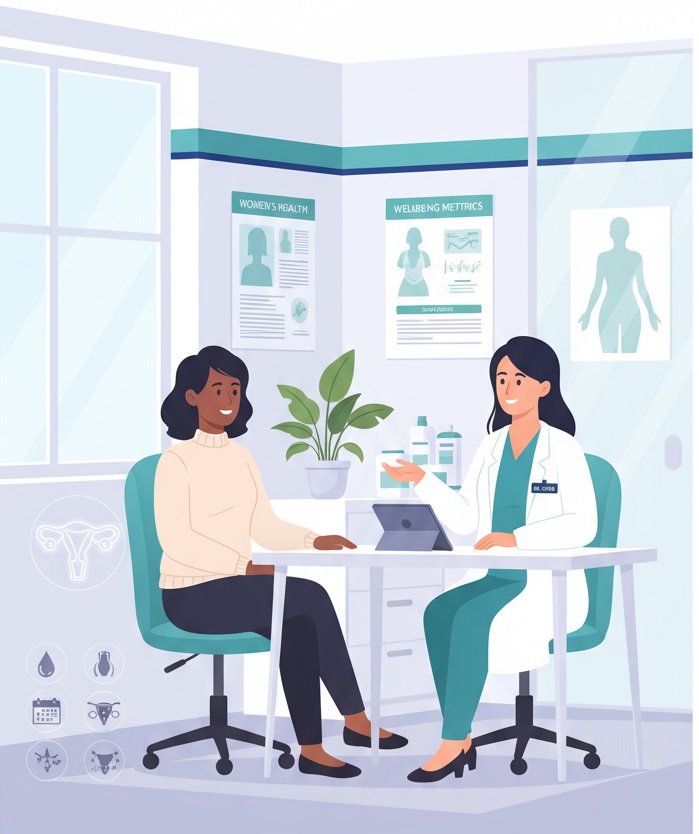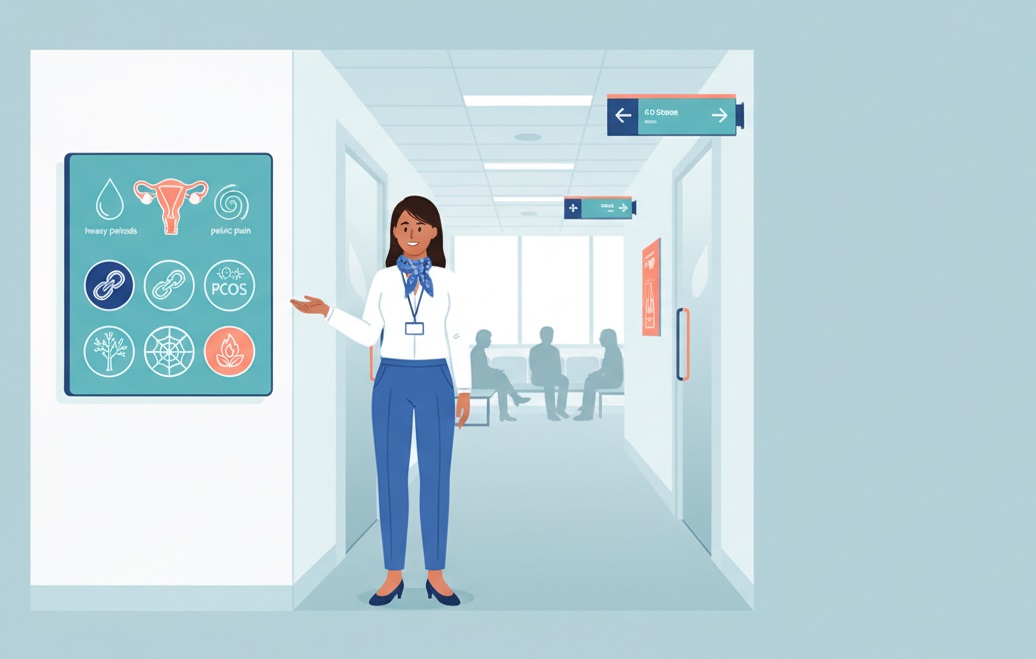Most Common Gynaecological Problems: A Guide from mydoctors.uk
At mydoctors.uk, we see the most common gynaecological problems across all life stages, from first periods to menopause. This trusted guide explains symptoms, when to seek help, and the tests and treatments typically offered in the UK. It is educational and not a substitute for personalised medical advice.
1. Heavy menstrual bleeding
Heavy periods can cause anaemia, fatigue, and disruption to daily life. Common causes include fibroids, adenomyosis, polyps, and hormonal imbalance. Typical UK work‑up includes blood tests and pelvic ultrasound. Treatments range from tranexamic acid and NSAIDs to the levonorgestrel IUS, endometrial ablation, or myomectomy, tailored to your goals. Heavy bleeding is among the most common gynaecological problems we assess.
2. Pelvic pain and painful periods
Dysmenorrhoea and non‑cyclical pelvic pain may be linked to endometriosis, adenomyosis, pelvic inflammatory disease, or ovarian cysts. Assessment often includes a history, pelvic examination, swabs, and ultrasound. Management can include hormonal suppression, pain strategies, pelvic health physiotherapy, and, where appropriate, diagnostic laparoscopy. Pelvic pain frequently features among the most common gynaecological problems.

3. Irregular periods and PCOS
Irregular or absent periods, acne, and hirsutism may suggest PCOS. Diagnosis uses history, blood tests, and ultrasound. Management includes lifestyle support, cycle regulation, metabolic screening, and fertility planning when needed. PCOS is one of the most common gynaecological problems affecting reproductive and metabolic health.
4. Vaginal discharge and infections
Thrush, bacterial vaginosis, and STIs are frequent and treatable. Red flags include bleeding after sex, fever with pelvic pain, and persistent symptoms. Self‑taken swabs and targeted treatment are standard. These infections are counted among the most common gynaecological problems seen in primary care.
5. Fibroids
Fibroids can cause heavy bleeding, pelvic pressure, bloating, or subfertility. Ultrasound is first line. Options include watchful waiting, hormonal therapy, uterine artery embolisation, myomectomy, or hysterectomy. Shared decision‑making is central at mydoctors.uk.
Most common gynaecological problems
6. Endometriosis
Common symptoms include painful periods, deep dyspareunia, chronic pelvic pain, and bowel or urinary symptoms linked to the cycle. When symptoms persist, referral for laparoscopy may be considered. Multidisciplinary care improves outcomes for one of the most common gynaecological problems impacting quality of life.
7. Ovarian cysts
Functional cysts often resolve spontaneously. Others (e.g., dermoids, endometriomas) may need monitoring or surgery depending on size, ultrasound features, and symptoms. Sudden severe pain can indicate torsion and needs urgent assessment.
8. Perimenopause and menopause
Vasomotor symptoms, sleep changes, mood shifts, vaginal dryness, and urinary frequency are common. Support includes lifestyle strategies, vaginal oestrogen, and systemic HRT after individual risk–benefit discussions. Many menopause presentations overlap with the most common gynaecological problems in midlife.
9. Prolapse and incontinence
Symptoms include a vaginal bulge, heaviness, urinary leakage, urgency, or frequency. Treatments range from pelvic floor exercises and pessaries to surgical repair, typically with urogynaecology input.
10. Postcoital or intermenstrual bleeding
While often benign (e.g., ectropion, polyps, infection), these symptoms require assessment to exclude significant pathology. Keeping cervical screening up to date and timely referral to colposcopy when indicated are key.
Red flags: seek urgent care
- Severe or sudden pelvic pain, especially with vomiting or fainting.
- Heavy bleeding soaking pads or tampons hourly.
- Positive pregnancy test with pain or bleeding.
- Postmenopausal bleeding.
- Fever with pelvic pain or offensive discharge.
NHS and private pathways at mydoctors.uk
- NHS: GPs provide initial assessment and refer to gynaecology where needed. Urgent suspected cancer pathways aim for assessment within two weeks.
- Private: You can self‑refer for faster access to scans and specialist care. We coordinate with your NHS GP for continuity.
How to prepare for your appointment
- Keep a symptom diary (cycle dates, pain scores, triggers).
- Bring medication lists and any prior results.
- Consider a support person and request a chaperone if preferred.
- Write down your key questions.
At mydoctors.uk, our clinicians assess the most common gynaecological problems with evidence‑based care, clear explanations, and shared decisions.

Do You Have Any Questions?

FAQs
What are the most common gynaecological problems?
A: Common issues include heavy menstrual bleeding, pelvic pain and painful periods, PCOS, vaginal infections, fibroids, endometriosis, ovarian cysts, perimenopause and menopause symptoms, prolapse, urinary incontinence, and bleeding after sex or between periods.
Q: When should I seek urgent help?
A: Seek urgent care for severe or sudden pelvic pain, very heavy bleeding soaking pads or tampons hourly, a positive pregnancy test with pain or bleeding, postmenopausal bleeding, or fever with pelvic pain and offensive discharge.
How are the most common gynaecological problems diagnosed?
A: Assessment typically includes medical history, pelvic examination, swabs for infection, blood tests, and pelvic ultrasound. Some conditions may require laparoscopy or colposcopy depending on findings.
Can I self‑refer privately at mydoctors.uk?
Yes. Private self‑referral is often available for faster access to scans and specialist consultations. We coordinate with your NHS GP for continuity of care.
Do all conditions need surgery?
No. Many conditions improve with medicines, devices such as the levonorgestrel IUS, pelvic health physiotherapy, or watchful waiting. Surgery is considered when conservative options are insufficient or when indicated by findings.
Do you offer chaperones and can I bring someone with me?
Yes. Chaperones are available for intimate examinations, and you can bring a support person unless clinic policy restricts due to space.
Will my information be confidential?
Yes. We follow UK confidentiality and data protection laws (GDPR). Information is shared on a need‑to‑know basis to support your care.
Can a gynaecologist do my smear test?
Yes—although most smears are done by GP or sexual health nurses. Private smears are available if you need one outside NHS screening intervals or age thresholds.
Do you treat menopause symptoms and offer HRT?
Yes. We offer tailored menopause care including lifestyle advice, vaginal oestrogen, and systemic HRT after an individual risk–benefit discussion. Complex cases are managed by specialists.
How quickly can I be seen?
Availability varies by location, but private appointments can often be arranged within days, with rapid access to pelvic ultrasound when clinically indicated.
